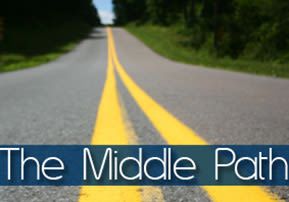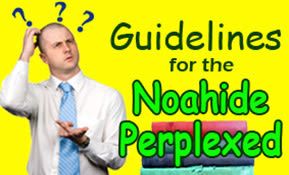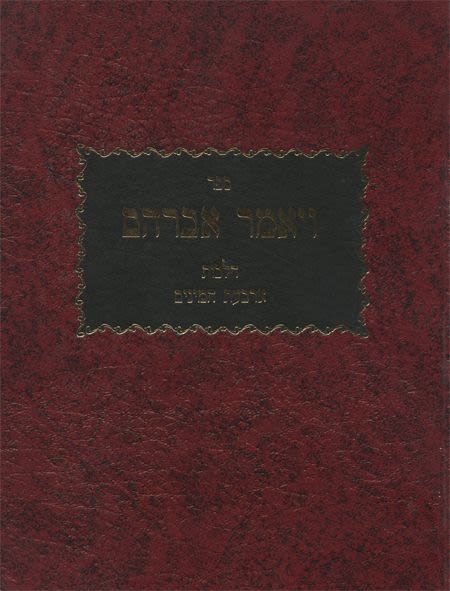
The Middle Path
With the Seven Universal Commandments, created by God for all of humankind, we have rules that are so basic, so general they fit into just about any culture on earth.

I was speaking with a really nice woman at the gym whose husband is a pastor. I asked her about his church. She said something like, “Well, the service is pretty traditional. The music is more contemporary. But we do believe that the Bible is the word of God…” She said this almost apologetically as if I was going to take her to the funny farm. I said, “That’s a good thing to look for in a church.”
For the rest of the day I could not stop thinking about her comment. Of course a rabbi, a pastor – pick your religion – thinks the Bible is God’s word, I said to myself. She made that comment almost like a warning to me, as if people who ask her about her church should know ahead of time that they are those extreme type of people who believe that humans did not make up the Bible. (For the moment, I am tabling the fact that clearly as a Bat Noach I do not share her belief system. Bear with me.)
I was not always a religious person, so it really should not surprise me that she felt the need to explain herself. She does not know me very well. Perhaps people have come to services and come away surprised. For a person who is not especially religious, or religious at all, it is downright strange to think that there is a God who writes books for us. I get that. It is not that I can wrap my brain around the creation of the Torah. I can not really. In fact when people ask me what I believe, I often say, “I believe X, Y, and Z. And it is OK with me if that sounds crazy to you. Don’t feel bad.” So much about the creation of Judaism, about the existence of God, about how He operates in this world with us is beyond my comprehension, like so much else in life, so I accept my limitations as a human and move on. I believe, I have faith, I accept the reality of things beyond the ability of my tiny little computer of a brain to sort out.
The reason I kept thinking about her comment is that lately I have so often felt like I am stuck between two extremes. On one end of the spectrum there are the people who attend religious services where talk of God is allowed, but where, inexplicably, we have no idea what God has communicated to human kind. I guess people come together to talk about the Bible as ancient literature. On the other extreme we are updated by the minute of the goings on of Islamic extremist militant sorts who bedevil Israel, bedevil each other, and bedevil Europeans who are apparently in agreement with them or terrified of them. We Bnei Noach are in the middle.
The void that is left in synagogues and churches where the Author of the Bible has been demoted and given a lowercase ‘a’ feels to me like a pothole the size of the Grand Canyon. Even when I was not religious it seemed like a complete waste of time to attend services at such institutions. I realize that is judgmental and perhaps even wrong of me to say. I am not trying to be offensive. When we remove God from religion, or decide that all we have are the private revelations He gave people thousands of years ago – or our own unclear conversations with Him – we have a bunch of nothingness. It is a nothingness that no amount of shopping, anti-depressants, drugs, alcohol, travel, video games, potlucks, or self-help books, or literary discussion about the Bible can fill. The Torah is not a story. It is not mythology. Nor is it private revelation. It is not about taking the word of one person, or a few people. It is about revelation that approximately three million people experienced together at Sinai. “A Rational Approach to the Divine Origin of the Torah” is a lecture by Rabbi Lawrence Keleman wherein he explains far better than I ever could what exactly happened there. You can listen to it for free here.
So we Bnei Noach are not left floating in the void left when we remove the Author. But we are not at the other extreme either, by the grace of God. With the Seven Universal Commandments derived from Genesis, created by God for all of humankind, we have rules that are so basic, so general they fit into just about any culture on earth. Through prayer we connect with our Creator, which gives us the gratification of a terrific relationship with a mother or father. But it is a relationship that goes beyond ego gratification, or personal comfort and reassurance, to turning us outward towards our neighbor. The Torah teaches us how to love our neighbor, and it teaches us what the healthy and necessary boundaries are that protect us from one another, that protect us from those so obsessed with a life beyond this one, they have turned their religion into a cult of death, God forbid.
When we live by the Torah in a way that is appropriate for Gentiles, we have plenty of room to breathe. But we also have the guide rails to keep us from straying off the road altogether and the methods to protect ourselves from people who have given up on achieving peace here on earth. We have a personal relationship with the Author of the Bible that gives us the visceral understanding that He is everywhere. We have the power to ignore Him, but He can not be removed from a house of worship, or from anyplace on earth or diminished. And we know that His gifts to us are the methods and the ability to refine the world we live in now through love, generosity, respect for life, respect for property, patience, and gratitude. We don’t need to shove our beliefs down people’s throats at the tip of a sword, yet we are not lost in space with people who feel afraid to acknowledge their God and the tools He has given us for living here.












Tell us what you think!
Thank you for your comment!
It will be published after approval by the Editor.